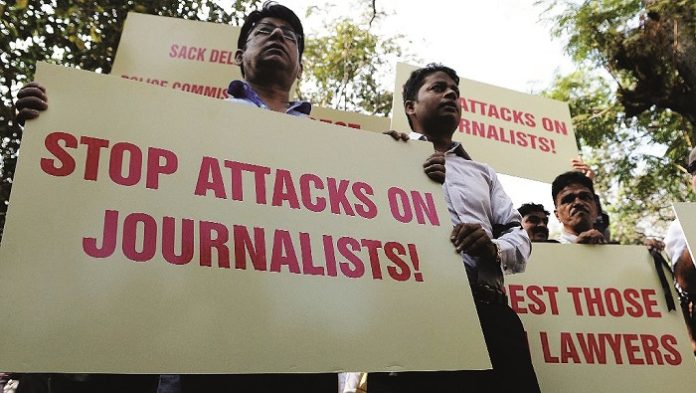
Indian journalists continue to get killed and there is very little being done to protect them or facilitate their work. India was among the three most dangerous countries for journalists in 2015, with nine reporters losing their lives either in the line of duty during the year or “for undetermined reasons,” according to the annual report of Reporters Without Borders.
The media watchdog said these deaths confirmed “India’s position as Asia’s deadliest country for media personnel, ahead of both Pakistan and Afghanistan.” Only war-torn Iraq and Syria recorded the deaths of more journalists than India. Four of the nine Indian journalists murdered in the past year were killed “for still undetermined reasons,” Reporters Without Borders (RSF) said.
Besides India, the eight other countries where the most journalists were killed are Iraq (11), Syria (10), France (eight), Yemen (eight), Mexico (eight), South Sudan (seven), the Philippines (seven) and Honduras (seven).
IFJ & NUJI demand investigation
The International Federation of Journalists (IFJ) joined its affiliate the National Union of Journalists – India (NUJI) in demanding investigations in the death of journalist Pooja Tiwari in suspicious circumstances in Faridabad, Harayana. The IFJ calls on the government to ensure a transparent investigation into the circumstances surrounding the journalist’s death.
Pooja Tiwari, a 28-year-old journalist working for DNA’s local online news portal had conducted a sting operation against several doctors and filed a story for its website alleging that they were involved in illegal abortions. After the publication of the story, the doctors filed a First Information Report (FIR) alleging that Tiwari was blackmailing them. She was suspended by DNA from her job which said this was a ‘standard operating process for the company.’
The Delhi Union of Journalists (DUJ), affiliated with the Indian Journalists Union (IJU), said the distressing episode illustrates the extreme vulnerability of journalists, who are often left to fend for themselves when cases, rightly or wrongly, are lodged against them for their professional work. The DUJ strongly criticized the DNA media house for suspending her and compelling her to contest the police FIR on her own.
Two murders in 48 hours
The International Federation of Journalists has condemned the murder of two ‘martyrs in the cause of press freedom’ in India in the space of 48 hours. Journalists Akhilesh Pratap Singh at Dewari village in Chatra district of Jharkhand and Rajdeo Ranjan, bureau chief of Dainik Hindustan at Siwan, Bihar were gunned down just hours apart on 12 and 13 May 2016.
The IFJ has backed calls by its affiliate the Indian Journalists Union (lJU) – which claims the two were killed as a result of their work exposing corruption and criminal activities among a ‘politico-criminal mafia’ – for a special investigative team to bring the killers to justice. IJU President SN Sinha, Secretary General Amar Devulapalli and Press Council of India (PCI) member K Amarnath said the reporters were martyrs in the cause of freedom of the press.
Another journalist, Akhilesh Pratap Singh, was shot dead by unidentified people near his home while he was on his motorcycle on 12 May 2016. Singh, 35, was the local correspondent for Taaza TV, a Hindi news channel based in Kolkata. Originally from Bihar state, Singh had settled down in Jharkhand working as a journalist for five years and was known for his critical reporting on corruption. Assailants fired at least five shots at Singh, two of which were immediately fatal. Singh is survived by his wife and two children.














